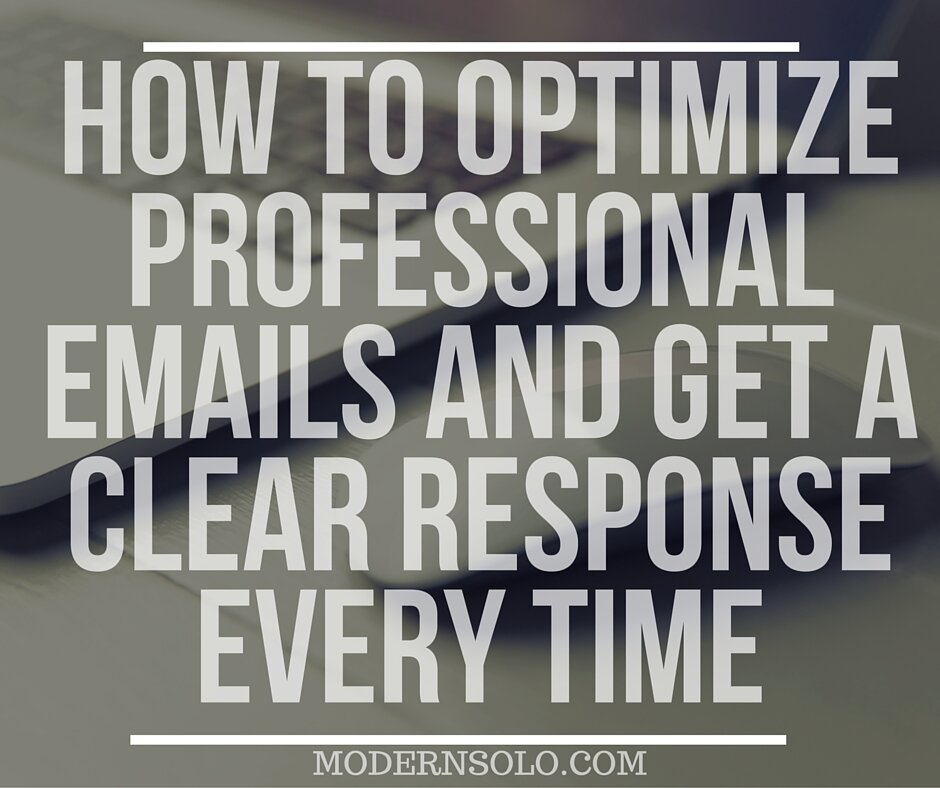How To Optimize Professional Emails And Get A Clear Response Every Time
 Most entrepreneurs write professional emails multiple times a day, but many put little thought into how they do it. These days, a large amount of communications with your clients or customers will happen through email, so it’s important to view what you write and how you write it as an extension of your brand.
Most entrepreneurs write professional emails multiple times a day, but many put little thought into how they do it. These days, a large amount of communications with your clients or customers will happen through email, so it’s important to view what you write and how you write it as an extension of your brand.
Make Sure Your Professional Emails Visually Reflect Your Brand
Have a professional email address
Get an email address with your domain. It look more professional, is memorable and is another form of brand recognition.
Set up a professional email signature
It’s a perfect use of space to show off brand, share your social media links, and make it easier for the email recipient to find other ways to contact you. Just make sure that whatever you add to your signature line renders well on mobile devices.
Spell check, spell check, spell check
Type out your email on a word processing program before you send it out if your email client doesn't have spell check built in. Poor spelling and grammar reflect poorly on your brand.
Clear and Simple Professional Emails Make The Reader More Likely To Respond
Less Is More
Keep your professional emails short, simple and concise. Most people get hundreds of emails a day, so if yours is a novel they will very likely skim if they read it at all.
Use lists and bullet points for multisubject emails
This is easier to read than a wall of text and your recipient can respond to each individual bullet point.
Have A Single Purpose For Your Email
Before writing an email, make sure you know why you are sending it and what you need from the recipient. Clearly conveying your purpose ensures you are not wasting the recipient's time and helps you get the type of response you are looking for.
Optimize The Use Of The Subject Line In Professional Emails
Use the subject line to summarize what your email is about.
This makes it easy for the recipient to see what it’s about when skimming their inbox and can urge them to respond quickly if necessary. For example, instead of “Meeting” a subject line that states “I need the agenda for the meeting by noon” lets the recipient know what the email is about and that you need a response by noon.
Change the subject line when the subject changes. Better yet, start a new email.
This will make it easier to find the conversation later and keep track of what the conversation is about.
Put key information in the first sentence of the email.
Some people will not read your email all the way through. Be sure to put the most important information first so you don’t have to repeat yourself later.
Make Professional Email Etiquette A Priority
Don’t send huge attachments
They are really annoying to download, especially since most people view emails on their phone. If you have to send a large attachment, try sending sending it as a link from Dropbox or Google Drive. That way it can be accessed anywhere without taking up valuable space on the reader's device.
Remember that everything you email can be publicized
Think of every email as public. Never email anything you wouldn't want the world to see, and be cautious when using reply all, CC and BCC. If you need to exchange sensitive information do it in person, over the phone, or through a secure portal.
Always send a response
It is always courteous to send a response, even if you are busy or not interested. If it will take you more than 24 hours to respond to any emails, set up an autoresponder that states when you will be able to respond. Or if you need more time to respond to a specific inquiry, send a quick response saying you will get back to them at a specific time. The latter has helped me immensely with managing client expectations and client satisfaction. In my family law practice emotions run high and everything feels like an emergency to my clients. So when I don’t respond some of them panic. Letting them know I got their email and will call or respond at a certain time shows I value their time and they are not being ignored. I constantly receive emails asking me to buy, join or sign up for something. Instead of ignoring them, a polite response stating that I am not interested usually puts an end to these requests.
Write in an authentic tone
Some people try to write emails like a formal letter and it comes off as inauthentic and it’s usually too long. You can still be professional without sounding stuffy. Clients and customers want to feel like they are communicating with a real person, not a form. Write the way you normally speak. Want more email tips delivered straight to your inbox? Join the Modern Solo Tribe.